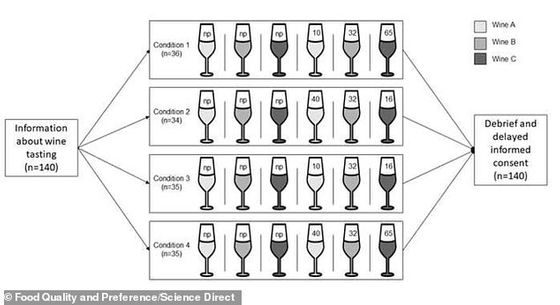Research results show that even cheap wine feels 'delicious with a high price tag'

Whiskey and beer experts have verified that it is possible to distinguish between cheap and high-end products in 100 shots, but another verification that asked ordinary people to evaluate wine shows that 'the average person has high wine.' It is impossible to tell if it is cheap. ' Another experiment, in which a person who often drinks wine was tasted with a price tag completely different from the original one, confirmed that 'the higher the price of cheap wine, the higher the evaluation'.
Price information influences the subjective experience of wine: A framed field experiment --ScienceDirect
https://www.sciencedirect.com/science/article/abs/pii/S0950329321000501
Cheap wine tastes better if we're told it's expensive, study finds | Daily Mail Online
https://www.dailymail.co.uk/sciencetech/article-9350177/Cheap-wine-tastes-better-told-expensive-study-finds.html
Higher wine price can enhance taste, says study --Decanter
https://www.decanter.com/wine-news/wine-price-taste-study-454675/
Professor Jens Garb's research team, who is studying the placebo effect at the University of Basel, Switzerland, evaluated the taste of 140 participants who visited the university's event by drinking three different prices of wine. I conducted an experiment to get them. None of the participants were wine experts, but 135 out of 140 people answered in advance that they 'drink wine on a regular basis.'

The wines used in the experiment were all Italian red wines made in 2013, but there was a big difference in price. Specifically, there are the following three types.
・ Wine A:
・ Wine B: Villa Donoratico Borgheri : 32 Swiss francs per bottle (approx. 3719 yen)
・ Wine C: Fattoria les Pupilles Saffredi : 65 Swiss francs per bottle (approx. 7555 yen)
In the experiment, we asked them to drink two glasses of wine A to C, for a total of six glasses. Of the two glasses into which each wine was poured, one was unlabeled and the other was labeled with the price. However, some labels have the correct price, while others have the price of another wine.

As a result of having each participant who finished drinking 6 glasses of wine evaluate the 'comfort' felt from the wine, the evaluation of all wines was the same without the label. This shows that the 'comfort' rating is strongly influenced by the price of the wine, not the taste of the wine itself.
On the other hand, if the low-priced wine A had a wine C price tag, it was dragged by the price and the evaluation of 'comfort' went up. On the contrary, even if the price tag of Wine A was attached to Wine C, the evaluation of 'comfort' did not drop. In other words, while cheap wines were tastier with higher price tags, expensive wines with cheaper price tags did not spoil the taste.
In addition, participants evaluated not only 'comfort' but also 'taste', but the result was that wines with higher actual prices were always evaluated as 'taste'. It was. This suggests that the evaluation of 'taste intensity' is not affected by the presence or absence of a price tag or the price written on the price tag.
Regarding the results of this experiment, Mr. Garb commented, 'In this experiment, it was found that the higher the price of wine, the better it was, but the wine company already knew that.' The research team also concluded in a treatise that 'the true taste of wine may be in the wine, or it may be price-dependent.'
Related Posts:







